EU law provides strong protection for geographical indications, including protected designations of origin (PDOs). This protection extends to any commercial use for products not covered by PDO registration, including use for non-comparable products that exploits or weakens PDO reputation. PDOs are also protected against misuse, imitation, evocation, and practices that may mislead consumers as to product origin or characteristics. Although PDOs benefit from broad protection, court cases against the use of PDOs for cosmetic products are rare.
The Regional Court of Warsaw recently confirmed that PDOs are protected against infringement in the cosmetics sector. On June 11 2025 (case No. XXII GW 744/24), the court upheld claims brought by Consorzio di Tutela della DOC Prosecco (Consorzio) against Alshaya Poland, the distributor of Bath & Body Works cosmetics in Poland.
Case background
Consorzio is the official body that represents Prosecco wine producers and is recognised by Italian authorities. Its mandate includes protecting the Prosecco PDO in trade and ensuring that only wines meeting the strict requirements set out in the relevant specifications can use this designation exclusively.
Consorzio discovered that the Prosecco designation was being used on over 20 Bath & Body Works cosmetic products in names and label descriptions, including “Pink Prosecco”, “Sparkling Prosecco”, and “Bubbly Prosecco”. Marketing further referenced “Prosecco” through social media promotions featuring references to “Toast”, “#prosecco”, and images of glasses with sparkling wine. Several examples are shown below.

Court proceedings
In July 2024, Consorzio requested a preliminary injunction to seize infringing goods from Bath & Body Works stores and warehouses. The court granted the request in ex parte proceedings, leading to the bailiff seizing tens of thousands of products from major Polish shopping centres. Following this, Consorzio filed its statement of claim.
Consorzio pursued the case under the Polish Act on Combating Unfair Competition and Regulation (EU) No. 2024/1143. It claimed that Alshaya’s practices constituted several forms of PDO infringement, including unlawful exploitation of Prosecco’s PDO reputation, evocation, and misleading consumers about the product’s origin and characteristics.
Alshaya argued that the use of “Prosecco” was merely a fanciful reference to fragrance notes, not an exploitation of its reputation. It contended that the regulation does not grant Consorzio absolute protection across all goods and services, especially ‘distant’ ones such as cosmetics. Alshaya also claimed that there was no association with the Prosecco PDO, given the widespread market use of “Prosecco” for cosmetics that Consorzio had tolerated for years.
The first-instance judgment
The first-instance court ruled in Consorzio’s favour, prohibiting the use of “Prosecco” for cosmetic and fragrance products, including in advertising, and ordering the destruction of infringing products. However, the court dismissed the claim for publishing information about the judgment.
The court established the clear reputation of the Prosecco PDO, particularly among urban consumers, who are the defendant’s target market. It noted the defendant’s various associations with the Prosecco PDO through hashtags, bubble images, and sparkling wine glasses, indicating apparent attempts to exploit Prosecco’s prestige and recognisability. The court confirmed that such practices constitute infringement through unlawful evocation and misleading consumers about product characteristics.
The defendant appealed the judgment.
Implications of a landmark case
This is the first ruling of its kind in Poland and is a pioneering case within the EU. The judgment closely followed the precedent set by the Court of Justice of the European Union in cases such as C-783/19 (Champanillo), extending its reasoning to the cosmetics sector. Notably, the court granted protection despite the dissimilarity between cosmetics and foodstuffs.
The central issue was the association consumers might draw between the signs used by the defendant and the PDO, thereby evoking the PDO and exploiting its reputation. In determining the association, it is essential to consider the full context in which the infringing indication appears.














